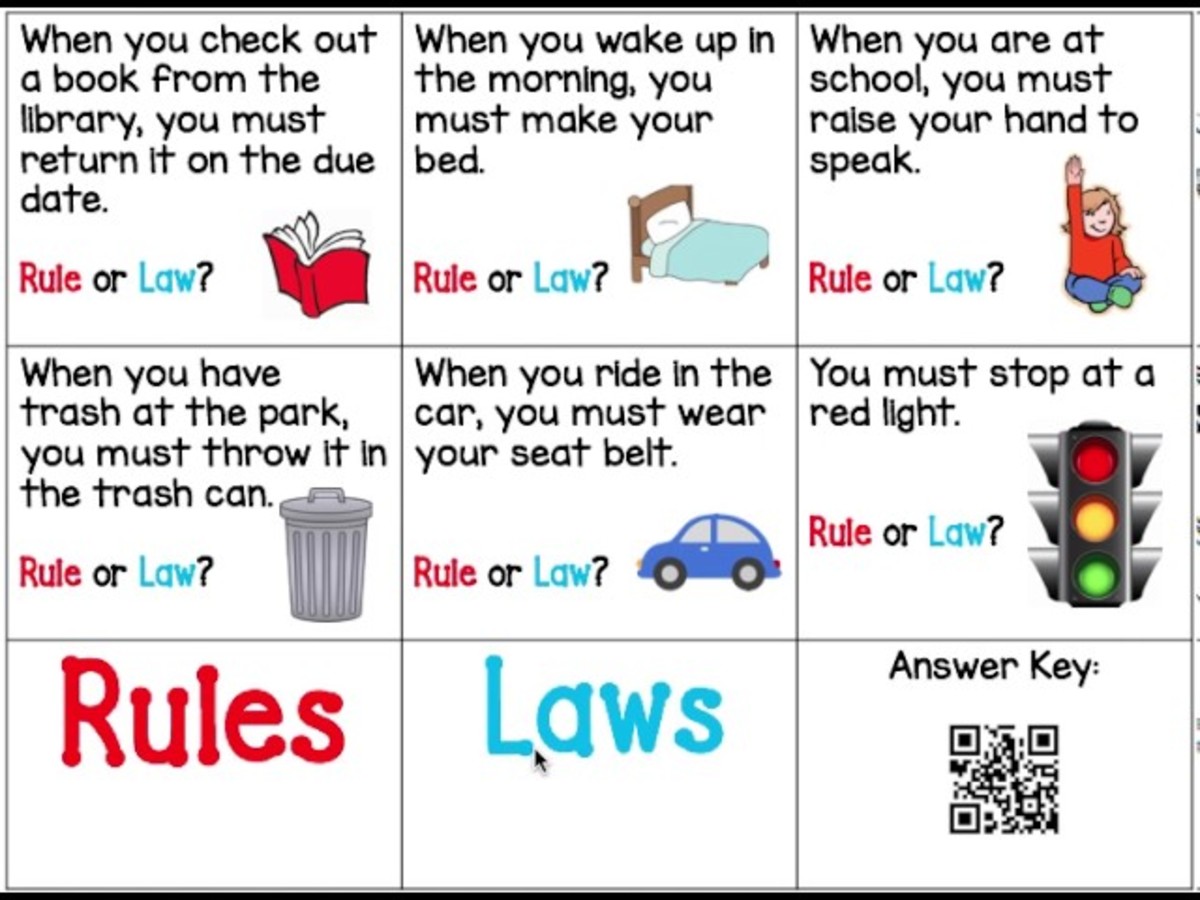The Debate Room

To Those of Us Who Love a Good Debate...
It has come to my notice that there is a lot of religious debate going on in the hubs and forums.
(Duh, right?)
All in all, I think this is a good thing. Overall, debate can sharpen our logic skills, call on us to challenge what we believe, and gives us an opportunity to learn about others and differing viewpoints.
Can.
More often than not, however, it seems to have this bad habit of developing into a cyber gladiator arena with people attempting to spill each other’s guts.
I myself have engaged in many of these religious debates, and have encountered good arguments from people of all religions (or lack thereof): people including the atheist, the agnostic, the theist, the deist, etc. However, I have also encountered illogical arguments from all sectors of belief. I find this lamentable. (I target particularly the Christian or believer, simply because I am also a believer and feel I can do so intelligently and without hostility. However, I will get to that later…) I find a lot of times that few words that are exchanged, actually contribute to the discussion; instead, they serve only to ridicule and cut others down. Would it not be better to accept and understand another’s viewpoints? To accept and respect those with whom we debate, instead of blinding ourselves to everything that is said, and making our points by pointing fingers and cutting people down? Yes, argue logic. Yes, argue reason. But don’t use sticks and stones…
And no, I am not about to propose that we all hold hands around the campfire and pretend that we all can get along. (That would be nice, wouldn’t it? Unless you aren’t into sitting in the dirt.) Unfortunately life stinks and we all don’t get along and we don’t agree. Period. This being given, I think it’s healthy to debate. However, I find it sad that a lot of debat is begun not in an attempt to “sit at the round table,” if you will, and discuss. It’s just an avenue for people to whip out their personal foghorns to blare out their beliefs and rail at each other in rage. I include all people of all religions (or… “non”-religions) in this assessment, although I shall later become particularly brutal toward those who would probably consider me a “fellow believer.” Yes that’s right. I have a beef with my fellow believers…
Anyway, to continue the topic at hand: our actions make sense, really. I mean, we’re human. If something irritates us or if we feel someone is being ignorant or illogical, it makes us mad. It makes me mad. It makes others mad. We all just get freaking mad. (Although some are better at controlling it than others. *cough*like me *cough* :P j/k) The point is: I would really like to see more respect and logic in the debate room, wherever that place may be. I admit I myself am guilty of letting my own anger get the better of me and using a disrespectful tone towards others when discussing particular sensitive topics. Why? I’m human. We’re all human. But I think we could accomplish a lot more with mutual understanding. (Think campfire.)
I am now about to branch off into dangerous territory. I target this next section towards my fellow believers. Or at least, those who claim to be. I want to point out something that I find rampant throughout what we typically call the “body of Christ.”
I believe in the existence of God, so I believe I can say what I’m about to say without the unfortunate stigma which most atheists or agnostics, etc. immediately get plastered onto them whenever they attempt to comment to a Christian or “believers’” posts or articles; and I say this out of concern for my fellow believers, wherever they are:
Disclaimer: My words are not aimed at any particular person. I speak generally concerning activity I have seen in my day to day life, living with and among a variety of types of “believers.” Disclaimer #2: I love all my fellow believers. This is an encouragement, not an accusation.
Here we go.
There is a close-mindedness rampant among us. (I know, you’ve heard this before. Please hear me out.) Have you ever asked yourself why you believe what you believe?
Is it because it makes sense to you and you believe it because you want to, or because by human nature you are clinging to that which you have always had? Is it because you feel some sort of overly righteous and egotistical indignation at the world for not believing in God and feel you need to bash down any opposition that may exist? Is it because your parents did?
Why do I ask this? Because it affects how we treat the people around us. And that is an important topic in Jesus’ teaching.
There are three main types of attitudes I find rampant in the body of believers that I would love to see change, because I believe that in doing so we would enable ourselves to treat others the way Christ would have us treat them. To clarify, I point these out in the context of debate. These three are: an unloving attitude towards those who believe differently from us; an agenda when we debate; and refusing to be logical in our debates.
I find that a lot of times most Christians’ attitude towards unbelievers is somewhat frightening. Almost disturbing. Some attitudes bring to my mind a rather frightening image of a despot attempting to wage a holy war and squelch the opposition.
Let’s remember that when we discuss our beliefs with those who do not share them, we are addressing people. Real people. I find many of us clinging to attitudes which, if given careful thought, go directly against the entire way of life that Christ called us to live. I typically find an undercurrent of the belief that “those non-believers out there” are “enemies” and “out to destroy the kingdom of God” and therefore we must “set it right!” They’re people. Not demons for goodness’ sake.
Most likely they’re real people who have thought about the world logically, find that some stuff doesn’t make sense, look at their surroundings and make conclusions accordingly that there doesn’t seem to be a God, or that God exists in some other fashion. Whatever their reason, they have a reason to think the way they think. What is so wrong about that? Think about it. No one will consciously believe something that they know is a lie. (to which you may say “duh ashton.” ) But seriously. Think about it. Before you take up your sword and holler out a battle cry, unite yourselves with those you see as “opponents” and find your common humanity. We’re all human. We’re all looking for answers. We all want the truth.
Why do we turn our noses up and call others “the world” and “the carnal” and “the ungodly,” and refuse to see the ungodly in ourselves?
No. Put down your sword for a minute...did not Christ tell us to love everyone? Even those who abuse, mistreat, and misuse us? Be careful you are not the one doing the mistreating. Did he not heal the ear of the man whom Peter swung his mighty Excalibur at? Who was Jesus more angry at? The people who probably could care less if God existed? Or the ones who CLAIMED to know God and treated other people like they were less than they are? (Pharisees?) To be honest with you, I find that those who claim to be Christians are the ones who, majority of the time, are the ones who do a lot if not most of the hurting in this world. That’s why the Christian has developed the stereotype that it has: of being legalistic, judgemental, self-righteous people. Before you get angry at someone for having a stereotype, ask yourself why they have that stereotype and maybe more importantly: am I contributing to the stereotype?
After asking yourself the question of why do you believe what you believe, another good one to ask would be: why am I debating about God in the first place? Is it to help convince someone that there is a God that loves them and wants to save them? Or is it because of a natural human inclination to want to devote ourselves to a cause?
Not everything that people do in the name of God or in an attempt to do the “work of God” is necessarily good. Plastering God’s name onto something doesn’t make it godly any more than plastering a license plate on a dresser makes it a car. Are we sure we’re not plastering God’s name to our own agenda?
How much sense does it make if we, in the name of GOD, choose to get into a debate to defend God’s existence? Does God really need defending? Not really. Then our purpose is to get the other person to believe or at least consider that what we are saying is true, right? Well, why would we want them to do that? Typical response would be, you’d want to see them believe the truth and go to heaven. That presumes actually caring for that person. So how much sense does it make to bash a person into believing something, if you supposedly care about them? Let’s watch ourselves. Don’t get caught up into the “cause” and forget the cause of your “cause.”
Here is another common attitude I find among my fellow believers which makes me very sad: lack of logic. “We don’t need science.” “I don’t have to prove it.” “It’s all about faith, not about what makes sense.” Um…sorry, but God gave us minds, and God gave us logic. Do we really think that somehow the processes of natural earth, which scientists explore and reveal to us, is going to contradict anything about God? So why act like science and religion are enemies? For example, so what if scientists, both Christian and non-Christian, seem to find that the earth is a million years old? Is it not possible that God created it a million years ago and we are misinterpreting something in the text?
People have legitimate reasons to think that there is no God. (We can’t see him..he’s supposed to be a holy God and yet terrible things happen, etc.) It doesn’t seem logical. Let’s not Dpretend there are unanswered questions. Don’t pretend there aren’t at least apparent contradictions. If you believe what you believe, okay, but acknowledge apparent contradiction and if you can’t find an answer for it, admit it. Please. If you don’t, it just makes you out to be a fool. Most times the only reasons that those “hard to understand” topics and apparent contradictions which pop up in the Christian “religion,” (I don’t like titles, but for sake of clarity…) don’t bother us is because we believe in God and therefore shrug off those things as “well we just don’t understand God’s ways”. If that is how you think, then okay; but at acknowledge that this is the same type of reasoning employed in other religions. If you encountered what might be considered as a possible contradiction in another religion, you wouldn’t try to defend it. You’d squash that idea. Like a pancake. Why don’t we squash ours? Because we’re convinced that what we believe is right. Therefore we aren’t bothered by contradictions.
And we wonder why we’re labeled as illogical fanatics?
Maybe because a lot of us are. Or at least can be if we’re not careful and if we are honest with ourselves. If I may be so bold: it’s a stereotype well earned. (holds up shield against shotgun bullets.) However, it’s a stereotype I hope to avoid. And help change.








